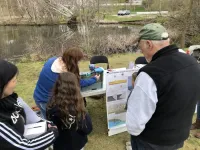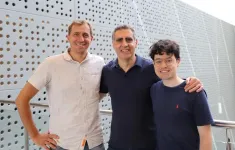(Press-News.org) University of Houston Assistant Professor of Biology and Biochemistry Quentin Vicens has been awarded a $1.2 million grant from the National Institute of General Medical Sciences to unravel the mystery of Z-RNA – an enigmatic RNA structure within our cells that plays a critical role in immune response. This work is in collaboration with the laboratory of Beat Vögeli, associate professor at the University of Colorado and co-recipient of the award.
Vicens, Vögeli and their research teams are on a mission to understand how Z-RNA forms, how often it appears in our genetic material and what it means for proteins that are known to recognize this structure. They are focusing on a process called RNA editing, where one letter in RNA is transformed into another. Think of it like changing a letter in a word to make a new word. This editing happens more in conditions like cancer and infections and is linked to the presence of a unique protein part that can attach to Z-RNA.
“Helices come in generally two ‘flavors.’ The typical formation is to the right. The one to the left is not stable, but it does occur in cells. Yet researchers do not yet truly understand how it is possible for this helix to occur in cells when it is not stable,” said Vicens, a faculty member in UH’s College of Natural Sciences and Mathematics. “We want to know what happens at the molecular level that causes this RNA structure to flip from one direction to another and then revert. Think of a staircase spiraling up to the right that one day spirals to the left.”
The team will use nuclear magnetic resonance or NMR methods, an expertise of Vögeli’s lab, which involves magnets and radio waves taking pictures of the tiny structures inside our cells. This way, they can see how RNA changes from its usual form to the Z-form.
Vicens’ lab group is interested in using cryo-electron microscopy that lets them see large groups of proteins and molecules frozen in a glassy state. They are also diving into the world of genomics by studying how natural modifications of cellular RNA affect whether Z-RNA is adopted in cells.
While the research delves into the fundamental science of RNA biology, it also has promise for understanding and potentially addressing various diseases, like Aicardi-Goutières syndrome, as well as cancer and autoimmune deficiencies.
“When RNA gets edited incorrectly, it can lead to these diseases, making it vital that we fully understand their function,” said Vicens. “We hope that this work reveals how proteins and Z-RNA work together, potentially giving us new ways to diagnose or treat these illnesses.”
Research reported in this publication was supported by the National Institute of General Medical Sciences of the National Institutes of Health under award number R01GM150642. The content is solely the responsibility of the authors and does not necessarily represent the official views of the National Institutes of Health.
END
UH researcher tackles mysterious Z-RNA structure and its potential connection to diseases
Assistant professor Quentin Vicens awarded $1.2M from National Institute of General Medical Sciences
2023-11-02
ELSE PRESS RELEASES FROM THIS DATE:
Different antibiotics’ effects on gut microbes may impact hypertensive organ damage
2023-11-02
Highlights
In a preclinical study, altering the intestinal microbiome with narrow-spectrum antibiotics affected organ damage associated with hypertension.
Results from the study will be presented at ASN Kidney Week 2023 November 1–November 5.
Philadelphia, PA (November 2, 2023) — New research in rodents indicates that altering gut microbes may affect the development of organ damage associated with hypertension. The findings will be presented at ASN Kidney Week 2023 November 1–November ...
Are sodium-glucose cotransporter-2 inhibitors safe for patients with diabetes and cancer?
2023-11-02
Highlights
Investigators found that in patients with diabetes and cancer, sodium glucose cotransporter-2 inhibitors were associated with a higher risk of diabetic ketoacidosis and fracture and a lower risk of acute kidney injury and urinary tract infection compared with glucagon-like peptide 1 receptor agonists.
Results from the study will be presented at ASN Kidney Week 2023, November 1–November 5.
Philadelphia, PA (November 2, 2023) — Sodium-glucose cotransporter-2 inhibitors (SGLT2i) have heart- and kidney-related benefits for patients with and without diabetes ...
Wildfire air pollution may increase risks of hospitalization and death among patients on dialysis
2023-11-02
Highlights
Among individuals receiving in-center hemodialysis treatment in Washington, Oregon, and California, exposure to wildfire-related air pollution was associated with elevated risks of hospitalization and mortality.
Results from the study will be presented at ASN Kidney Week 2023 November 1–November 5.
Philadelphia, PA (November 2, 2023) — In analyses of data from western US states, increases in wildfire-related air pollution around dialysis clinics were linked to higher rates of hospitalizations and deaths among patients. The research will be presented at ASN Kidney Week 2023 ...
Simple automated tool prompts physicians to screen patients with diabetes for kidney disease
2023-11-02
Highlights
A tool that provides an automated prompt to physicians increased kidney disease screening in patients with type 2 diabetes.
Results from the study will be presented at ASN Kidney Week 2023 November 1–November 5.
Philadelphia, PA (November 2, 2023) — Investigators have implemented an automated health maintenance tool created by the National Kidney Foundation into electronic medical records to prompt primary care physicians to screen for chronic kidney disease (CKD) in adult patients ...
FSU researchers capture high-resolution images of magnesium ions interacting with CRISPR gene-editing enzyme
2023-11-02
The gene-editing technology known as CRISPR has led to revolutionary changes in agriculture, health research and more.
In research published in Nature Catalysis, scientists at Florida State University produced the first high-resolution, time-lapsed images showing magnesium ions interacting with the CRISPR-Cas9 enzyme while it cut strands of DNA, providing clear evidence that magnesium plays a role in both chemical bond breakage and near-simultaneous DNA cutting.
“If you are cutting genes, you don’t want to have only one strand of DNA broken, because the cell can repair it easily without editing. You want both strands to be broken,” said Hong ...
Online grocery shopping promotes less variety, fewer impulse buys
2023-11-02
ITHACA, N.Y. – Online grocery carts tend to include less variety and fewer fruits and vegetables than those in a trip to a brick-and-mortar supermarket – but online shoppers are less susceptible to unhealthy impulse buys, according to a new Cornell University study.
In an analysis of nearly 2 million shopping trips, the researchers found that within a given household, Instacart baskets are more similar to each other from week to week than in-store carts, with more than twice as many overlapping items between successive trips to the same retailer.
Nutritionally, however, ...
Can AI help boost accessibility? These researchers tested it for themselves
2023-11-02
Generative artificial intelligence tools like ChatGPT, an AI-powered language tool, and Midjourney, an AI-powered image generator, can potentially assist people with various disabilities. These tools could summarize content, compose messages or describe images. Yet the degree of this potential is an open question, since, in addition to regularly spouting inaccuracies and failing at basic reasoning, these tools can perpetuate ableist biases.
This year, seven researchers at the University of Washington conducted a three-month autoethnographic study — drawing on their own experiences as people with and without disabilities — to test AI tools’ utility for accessibility. Though ...
UMass hydrogeologists develop innovative way to predict saltwater intrusion into groundwater using Plymouth, Mass. as test case
2023-11-02
November 2, 2023
UMass Hydrogeologists Develop Innovative Way to Predict Saltwater Intrusion into Groundwater Using Plymouth, Mass. as Test Case
Working closely with local conservation group, researchers develop new model to predict climate-change driven saltwater intrusion that is transferable to other vulnerable coastal communities
AMHERST, Mass. – As the world warms and ice sheets melt, the ocean continually rises. The greater Boston area can expect to see between one and six feet of sea level rise by 2100, according to recent ...
Looking sharp! Shark skin is unique and may have medical use, too
2023-11-02
By David L. Chandler
WOODS HOLE, Mass. -- Sharks differ from other fish in many ways, including an apparently remarkable ability to heal from wounds, according to reports of sharks recovering from injuries sustained in the wild. While this healing ability has not yet been documented in controlled laboratory conditions, some of the chemical compounds found in shark skin may have significant biomedical potential.
To investigate this possibility, two dermatology researchers from the Karolinska Institute in Sweden carried out research on a small shark, the spiny dogfish (Squalus acanthias) and other cartilaginous fish species at the ...
A known environmental hazard can change the epigenetics of cells
2023-11-02
Epigenetics, the chemical mechanisms that controls the activity of genes, allows our cells, tissues and organs to adapt to the changing circumstances of the environment around us. This advantage can become a drawback, though, as this epigenetic regulation can be more easily altered by toxins than the more stable genetic sequence of the DNA.
An article recently published at Science with the collaboration of the groups of Dr. Manel Esteller, Director of the Josep Carreras Leukaemia Research Institute ...
LAST 30 PRESS RELEASES:
National poll finds gaps in community preparedness for teen cardiac emergencies
One strategy to block both drug-resistant bacteria and influenza: new broad-spectrum infection prevention approach validated
Survey: 3 in 4 skip physical therapy homework, stunting progress
College students who spend hours on social media are more likely to be lonely – national US study
Evidence behind intermittent fasting for weight loss fails to match hype
How AI tools like DeepSeek are transforming emotional and mental health care of Chinese youth
Study finds link between sugary drinks and anxiety in young people
Scientists show how to predict world’s deadly scorpion hotspots
ASU researchers to lead AAAS panel on water insecurity in the United States
ASU professor Anne Stone to present at AAAS Conference in Phoenix on ancient origins of modern disease
Proposals for exploring viruses and skin as the next experimental quantum frontiers share US$30,000 science award
ASU researchers showcase scalable tech solutions for older adults living alone with cognitive decline at AAAS 2026
Scientists identify smooth regional trends in fruit fly survival strategies
Antipathy toward snakes? Your parents likely talked you into that at an early age
Sylvester Cancer Tip Sheet for Feb. 2026
Online exposure to medical misinformation concentrated among older adults
Telehealth improves access to genetic services for adult survivors of childhood cancers
Outdated mortality benchmarks risk missing early signs of famine and delay recognizing mass starvation
Newly discovered bacterium converts carbon dioxide into chemicals using electricity
Flipping and reversing mini-proteins could improve disease treatment
Scientists reveal major hidden source of atmospheric nitrogen pollution in fragile lake basin
Biochar emerges as a powerful tool for soil carbon neutrality and climate mitigation
Tiny cell messengers show big promise for safer protein and gene delivery
AMS releases statement regarding the decision to rescind EPA’s 2009 Endangerment Finding
Parents’ alcohol and drug use influences their children’s consumption, research shows
Modular assembly of chiral nitrogen-bridged rings achieved by palladium-catalyzed diastereoselective and enantioselective cascade cyclization reactions
Promoting civic engagement
AMS Science Preview: Hurricane slowdown, school snow days
Deforestation in the Amazon raises the surface temperature by 3 °C during the dry season
Model more accurately maps the impact of frost on corn crops
[Press-News.org] UH researcher tackles mysterious Z-RNA structure and its potential connection to diseasesAssistant professor Quentin Vicens awarded $1.2M from National Institute of General Medical Sciences






